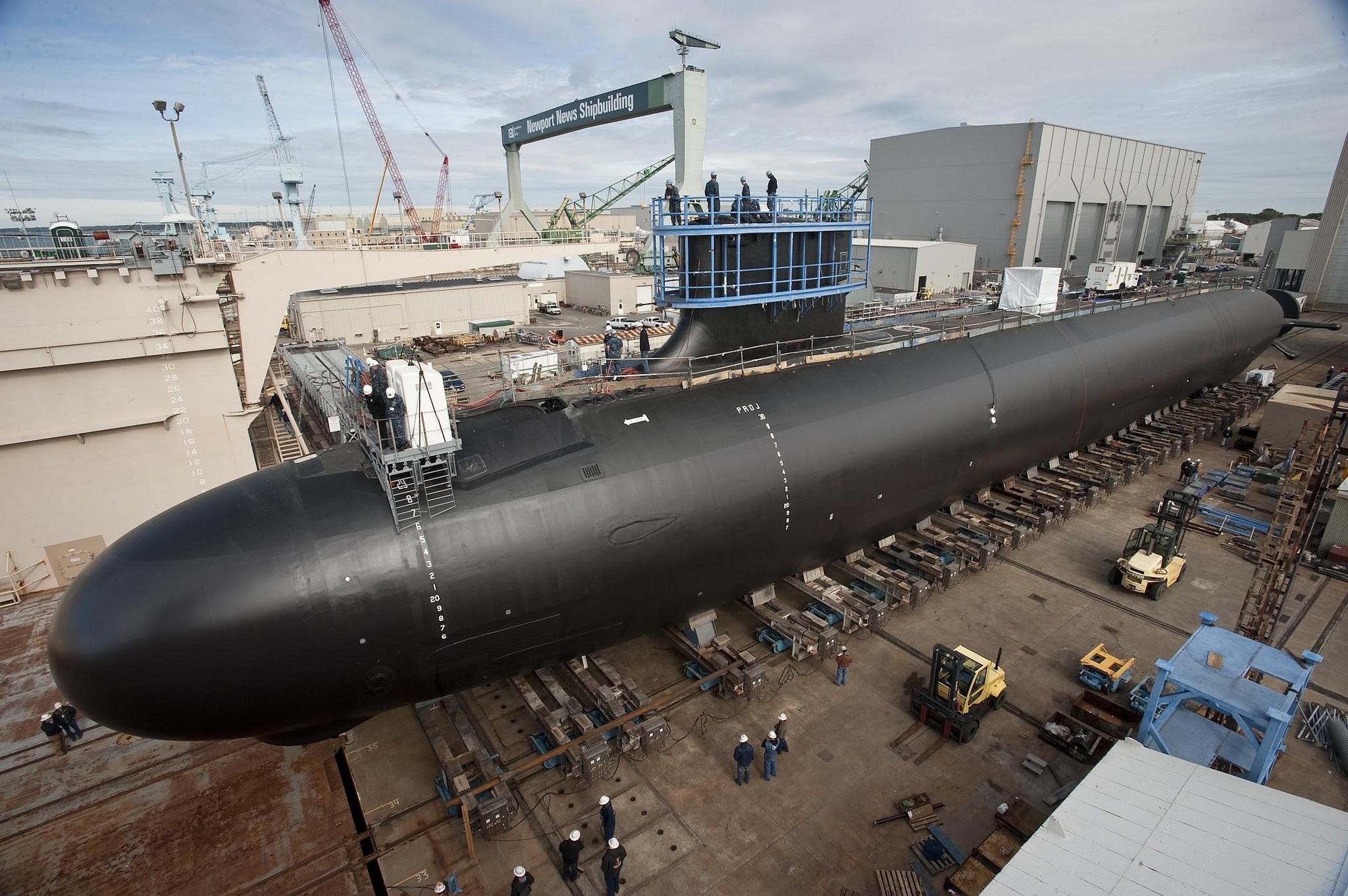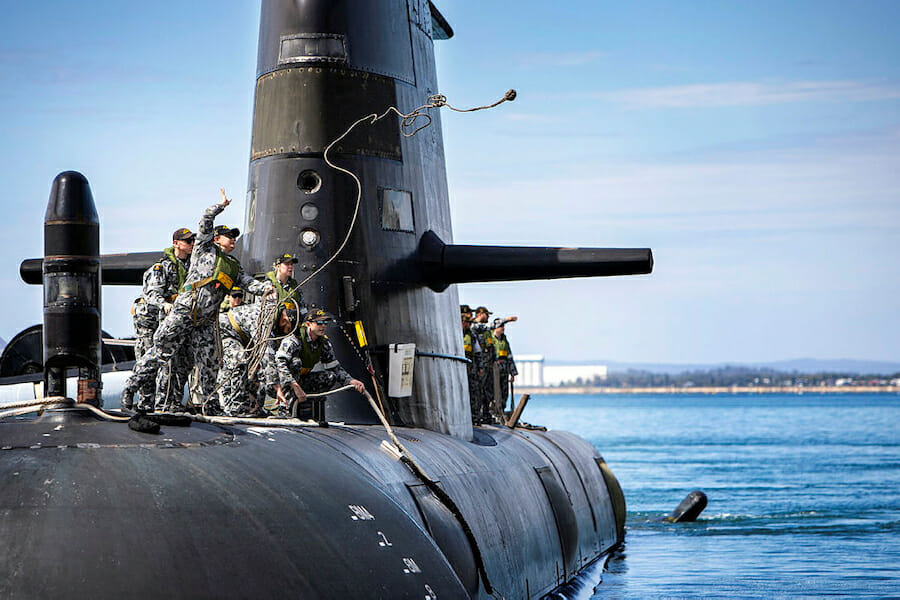
Troubled Waters: Nuclear Subs, AUKUS and the NPT
ICAN Australia
(January 2022) — In September 2021 the Australian, UK and US heads of state announced a new partnership “AUKUS” and their intention to assist nuclear-powered submarines for Australia. The Australian Government is currently undergoing an 18-month scoping period on this proposal.
ICAN Australia has launched a new report ahead of the tenth Review Conference of the Nuclear Non-Proliferation Treaty (NPT), postponed to August 2022, Troubled Waters: nuclear submarines, AUKUS and the NPT.
It is a critical time to consider carefully the implications of the nuclear submarine proposal for global efforts to safeguard nuclear materials, prevent nuclear proliferation and eliminate nuclear weapons.
Of key concern is the threat Australian nuclear submarines pose to the Nuclear Non-Proliferation Treaty, the broader safeguards regime and peace in our region. Further, Australian nuclear submarines would increase nuclear dangers and are an unnecessary, precedent-setting and retrograde step.
The report showcases a diversity of perspectives to assist your consideration of the proposal:
- Trevor Findlay, The AUKUS submarine project and the nuclear non-proliferation regime.
- Talei Luscia Mangioni, Pacific perspectives on proposed AUKUS nuclear-propelled submarines.
- Richard Tanter, Nuclear-powered submarines for Australia — stepping back into the Anglosphere and into a new Asian arms race.
- Monique Cormier, Implications for the international legal regime
- Muhadi Sugiono, Indonesian concerns about the proposed AUKUS nuclear-propelled submarine deal
While the Prime Minister Scott Morrison has stated that domestic nuclear weapons are not under consideration, his assurance does not provide enduring certainty of the government’s commitment to nuclear non-proliferation and disarmament. Australia’s ratification of the UN Treaty on the Prohibition of Nuclear Weapons would.

Troubled Waters: Nuclear Submarines, AUKUS & the NPT
INTRODUCTION
MARIANNE HANSON AND GEM ROMULD
HE AUKUS SUBMARINE PROJECT AND THE NUCLEAR NONPROLIFERATION REGIME
TREVOR FINDLAY
PACIFIC PERSPECTIVES ON PROPOSED AUKUS NUCLEAR-PROPELLED SUBMARINES
TALEI LUSCIA MANGIONI
NUCLEAR-POWERED SUBMARINES FOR AUSTRALIA — STEPPING BACK
INTO THE ANGLOSPHERE AND INTO A NEW ASIAN ARMS RACE
RICHARD TANTER
IMPLICATIONS FOR THE INTERNATIONAL LEGAL REGIME
MONIQUE CORMIER
INDONESIAN CONCERNS ABOUT THE PROPOSED AUKUS NUCLEAR-PROPELLED SUBMARINE DEAL
MUHADI SUGIONO
Introduction
Marianne Hanson and Gem Romuld
Nuclear weapons risks remain unacceptably high, disarmament is not progressing, and nuclear proliferation remains a serious and continuing concern.
Against this complex and uncertain background on September 16, 2021 the Australian, UK and US governments announced an expanded trilateral partnership, AUKUS. A key element of this agreement is the proposal to deliver eight nuclear-powered submarines to Australia. These are likely to utilise significant quantities of highly enriched uranium (HEU).
The AUKUS announcement came as a surprise to the vast majority of Australians. Many were perplexed by the decision and remain concerned about its domestic and international ramifications. The current Australian government, by comparison, seems remarkably sanguine about acquiring nuclear propelled submarines, and has dismissed concerns about any negative impact on the non-proliferation regime.
Many observers do not share this complacency or the assumption that the challenges this plan poses to IAEA verification procedures and the wider non-proliferation architecture can be easily managed.
Australia’s acquisition of nuclear-powered submarines is an unnecessary and retrograde step and we continue to call on the federal government to re-think this decision. ICAN Australia is not alone in this approach. When a public response to the Exchange of Naval Nuclear Propulsion Information Agreement was invited by the Australian Joint Standing Committee on Treaties over one hundred substantive submissions were received, despite only four days being provided for public comment.

These submissions were overwhelmingly against the nuclear submarine proposal and reflected concerns about such a profound reorientation of Australian security, defence, and nuclear policy (1). Unusually, former prime ministers from both parties of government have spoken strongly against the proposal.
The agreement to acquire nuclear-propelled submarines, using nuclear material for non- proscribed military purposes, exploits a gap in the NPT. This gap is one which has been eyed by other states, all of which to date have ultimately refrained from setting a destabilising precedent. If this proposal goes ahead, Australia will become the first non- nuclear weapon state to receive this highly sensitive technology. A further concern is that HEU is the most suitable material for ready and rapid conversion into a nuclear weapon, including a rudimentary one well within the means of non-state groups.
Australia has long supported nuclear non- proliferation efforts. It has supported domestic and international efforts to reduce and remove HEU from civilian uses worldwide, and claims to support a treaty controlling fissile materials. Acquiring large quantities of HEU — some suggest there would be more than 20 nuclear weapons worth (2) per submarine, on mobile platforms for several decades outside of usual IAEA safeguards and scrutiny — undercuts rather than enhances fissile material minimisation and security.
Australian nuclear submarines will entail multifaceted escalation in many things nuclear: more nuclear engineers and capacity in and out of the Australian Defence Force, further nuclear military enmeshment with the US and UK and closer integration with the operations of US nuclear armed ships, submarines and aircraft. It could work to soften the public on the stationing or storage of foreign nuclear weapons on Australian soil.
The Australian Prime Minister has stated that AUKUS and the submarine plan do not alter Australia’s policy not to acquire nuclear weapons. However, it is historical fact that Australia had ambitions to acquire nuclear weapons from the 1950s to the 1970s. Further, HEU-fuelled submarines could simplify and shorten the path for a future Australian government to build nuclear weapons in a number of ways, including from technical, regulatory and social perspectives.
The Prime Minister’s political assurance does not provide any enduring certainty and the planned submarine action breaks an existing taboo and sets a precedent which is already raising interest among other states to utilise the same logic to acquire similar sensitive nuclear material and capability.
The best assurance the Australian Government can give of its commitment to nuclear non- proliferation and disarmament is to sign and ratify the UN Treaty on the Prohibition of Nuclear Weapons, which outlaws possession, hosting, transfer and assistance with the use of nuclear weapons.

Further, the AUKUS proposal to supply Tomahawk cruise missiles to Australia to extend its long-range conventional strike capabilities, signals a possible weakening of Australian adherence to the Missile Technology Control Regime. Australia must strengthen, not weaken, this important agreement.
ICAN Australia has published this report to help inform consideration of this topic and its implications ahead of the long-awaited tenth NPT Review Conference. The Report assesses several issues:
Trevor Findlay examines the impact that the nuclear submarine deal could have on the NPT, and how the military-to-military transfer of enriched uranium to a non-nuclear weapon state like Australia poses a problem for IAEA verification. He reminds us that the proposal could pave the way for a variety of other non-nuclear states — some with possible proliferation motivations — to acquire nuclear materials and/or to avoid compliance with safeguards.
Talei Mangioni surveys the impact that the submarine announcement has had on Australia’s South Pacific neighbours, for whom the humanitarian impacts of nuclear accidents and tests are ongoing.
Richard Tanter surveys the broad strategic implications of enmeshing Australian defence capabilities more closely into American and British military postures, and the exacerbation of regional tensions and the risk of war.
Monique Cormier raises questions of whether a non-peaceful nuclear activity — that is, the use of enriched uranium for the military purpose of fuelling a submarine — contradicts the NPT’s object and purpose, and whether this is a legitimate action to take for a state-party that otherwise professes to be a champion of nuclear non- proliferation.
Muhadi Sugiono notes that AUKUS has created proliferation, strategic, and political concerns among some of Australia’s closest neighbours in South-East Asia, even as some Asian states have cautiously welcomed a greater role for the US and UK in the region.
This report conveys a diversity of concerns and reservations about the AUKUS nuclear submarine proposal held by many in our region. We hope that it will encourage active and critical engagement by the international community. Of key concern is the threat posed by this plan to the NPT, especially its non- proliferation and safeguards provisions, as well as the wider non-proliferation and nuclear security frameworks.
The threats of the COVID pandemic and rapid climate change have further highlighted our global interdependence and the importance of international collaboration and cooperation.
Efforts to advance nuclear non-proliferation are of critical importance and in a context where the Treaty on the Prohibition of Nuclear Weapons has entered into force and is gathering increasing support, the planned AUKUS step towards, rather than away from, utilisation of weapons-usable fissile material and technology carries unacceptable and unnecessary risks.
Marianne Hanson is Associate Professor of International Relations at the University of Queensland and ICAN Australia Co-Chair. Gem Romuld is the Director of ICAN Australia.